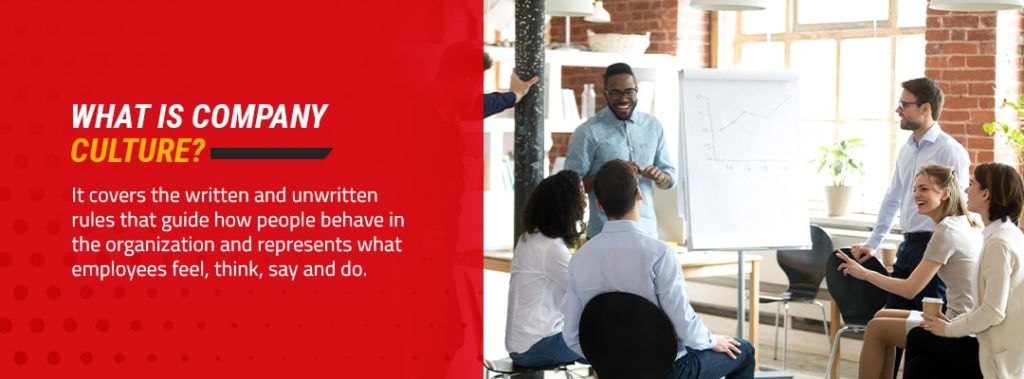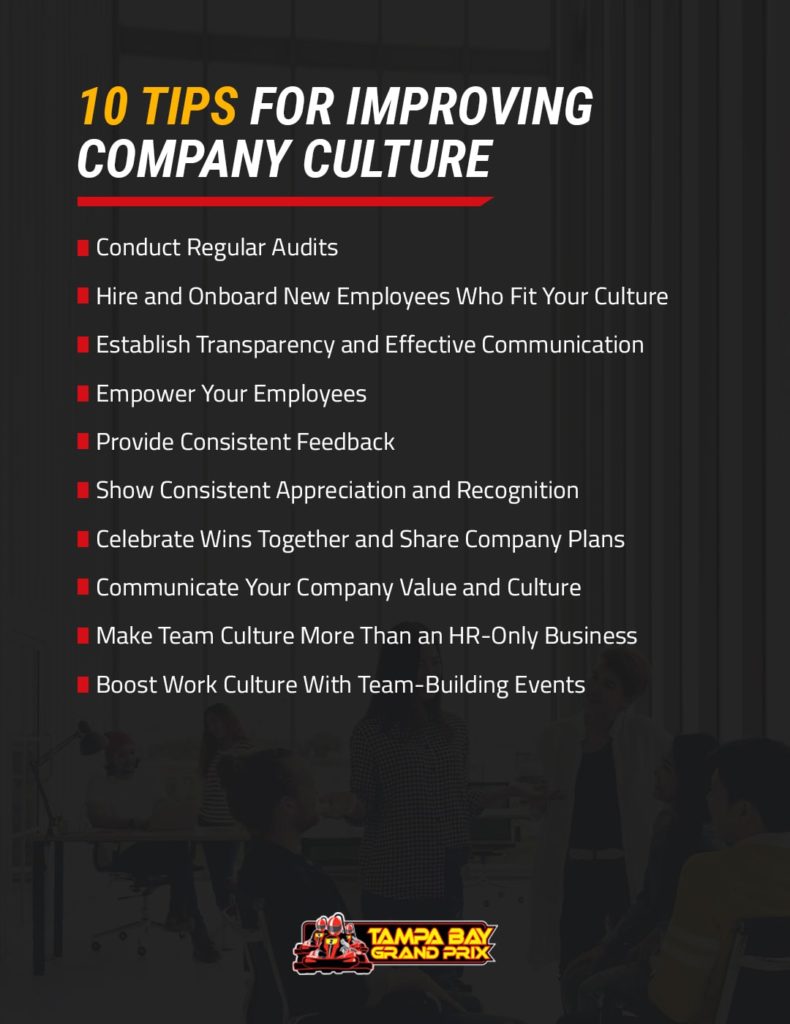How to Improve Your Company Culture

Competitive and profitable companies do more than build world-class offices and provide their employees the best tools. They create company cultures that boost productivity, work satisfaction and fulfillment.
This article will share six reasons workplace culture is crucial and the 10 best ways to improve your office culture. We’ll also reveal how team-building events can strengthen your company culture, best practices for engaging employees in team-building events and how go-kart racing can take your culture to the next level.
But first, what is company culture?
What Is Company Culture?
Company culture reflects an organization’s values and beliefs through shared norms and behavior in the workplace. It covers the written and unwritten rules that guide how people behave in the organization and represents what employees feel, think, say and do.
Your company culture includes various components, including workplace ethics, company mission statement, core values and management style.
Here’s where it gets interesting — your company already has a culture, even if you think you don’t. That’s because cultures form independently. If you don’t take steps to shape yours, it will likely evolve in a direction you don’t want it to go.
To ensure a healthy, positive company culture that drives growth, you must take a proactive approach.
Why Is a Strong Company Culture Essential?
As you’ll see shortly, how your employees perceive your company and their work affects your overall bottom line and can drive morale and turnover. Here are six benefits of developing a robust organizational culture.
1. Increased Employee Engagement and Productivity
Employee engagement refers to your workers’ emotional commitment to their team, job and your company’s goals. According to Gallup, highly engaged employees show 21% more productivity. An office culture that revolves around your employees’ output reduces stress, while increasing their attachment to your company and their desire to move your company’s mission forward. Engaged employees also feel useful and relevant in the workplace.
2. Increased Business Revenue
In one study, 12 companies with a robust organizational culture saw, on average, a nearly 700% increase in revenue growth. Here’s why. A well-crafted corporate culture improves employee engagement, and highly engaged employees are self-driven, innovative, more productive and strive to offer top-quality services to your customers.
Satisfied customers will buy more and refer you to their friends and family, which translates to more brand awareness and revenue for your company. Customers are actively looking for companies with defined goals and a healthy workplace to patronize.
3. Attract the Best Talents to Work for You
According to a Glassdoor survey, workers care more about culture than salary. Also, 77% of adults consider a company’s culture before applying for a job, and 79% say they evaluate a company’s vision and mission statement before applying.
From this information, we can infer that prospective employees are more concerned about job satisfaction than salary, and they prefer to work for businesses that promise a satisfying experience.
4. Increased Employee Retention
It typically takes 42 days to fill a vacant position and can cost an average of $4,129 per hire. That’s why high employee turnover causes damages beyond reducing business revenue and breaking work continuity. It also bites into your bottom line.
A robust company culture keeps your employees engaged, and engaged employees are less likely to leave. An excellent culture makes your employees excited about coming to work every morning.
5. Positive Brand Image
Customers are becoming more concerned about the values of the companies they give their business to. And, interestingly, your customers can infer your company culture from their interaction with your employees. An employee-minded company culture will inspire your staff to take excellent care of your customers, which translates to a positive brand image.
6. Improved Competitive Advantage
Companies whose leaders deliberately craft a robust company culture will run circles around businesses that take a passive approach to creating a corporate culture.
A healthy company culture promotes productivity, work fulfillment and satisfaction — all the ingredients needed to build superior products and services that give your company a competitive advantage in your industry.
When Is the Best Time to Revisit Your Company Culture?
Don’t wait for your employee morale to deteriorate before fixing it. Adopt a proactive approach to building a healthy company culture.
However, here are three signs your company culture needs a revisit:
- Your revenue and productivity have dropped.
- Your company has lost valuable employees.
- Your staff behavior is deviating from your company’s values and rules.
What Are the Types of Company Culture?
There are four fundamental types of company culture.
- Adhocracy culture: Adhocracy culture is innovation- and risk-oriented. Adhocracy culture focuses on doing the next big thing, being ahead in the industry and getting the ball rolling before anybody else. Companies like Google and Facebook deploy this culture.
- Hierarchy culture: Hierarchy culture is structure- and organization-oriented. Hierarchy culture concentrates on following rules, maintaining a chain of command and getting things done in a specific way.
- Market culture: Market culture is profitability- and results-oriented. Market culture emphasizes getting results and hitting deadlines, making it an ideal fit in highly competitive markets.
- Clan culture: Clan culture focuses on collaboration and communication, promoting a sense of family and working together to get the job done. The clan culture is excellent for startups.
How do you improve your company culture?
10 Tips for Improving Company Culture
Here are 10 tips for improving your company culture.
1. Conduct Regular Audits
Periodic audits will ensure you nip culture misalignment in the bud. Knowing your company culture’s status empowers you with the information to make helpful improvements.
A quick company culture survey can provide insight into your employees’ morale and areas for improvement. It also represents an opportunity to get your employees’ opinions on what they expect from their workplace.
2. Hire and Onboard New Employees Who Fit Your Culture
In your hiring process, look out for values, behaviors and attitudes that align with your company’s expectations.
For example, Zappos starts their screening process with a culture-fit interview representing 50% of their employability scoring. Hiring people who understand your mission ensures all employees support your company vision and values from the get-go. It also reduces the time and corporate resources you’d need to educate recruits.
How do you ensure new hires are a fit for your company? Focus more on asking questions that uncover their core values and attitude to work and team. How does their response align with your company’s core values? After hiring, create programs that welcome recruits to your company and educate them on your company’s culture.
3. Establish Transparency and Effective Communication
According to a survey from Officevibe, 31% of employees wish their managers interacted and communicated more with them.
Communication builds trust and transparency in the workplace, which improves employee engagement. Establish smooth communication between team members and across departments. For example, Facebook adopted an open-office structure to promote accessibility and communication within and across teams.
Promoting transparency is not solely HR’s job. Team leaders and executives must take the lead by consistently communicating updates and decisions in the company.
4. Empower Your Employees
Provide your employees with the tools, information and freedom they need to get the job done. Ensure workers have the appropriate level of autonomy to make decisions on behalf of the company. Avoiding micromanaging will increase your employees’ engagement with your company and make them more productive.
Here’s a little case study of this in action. Adobe has intentionally crafted one of the best cultures in the U.S. Instead of micromanaging, they provide their employees the support, trust and creative freedom they need to handle and complete challenging projects on their terms.
5. Provide Consistent Feedback
Don’t wait until the end of the month or your yearly performance evaluation to give feedback. Tell your employees your observations about their performance and how it aligns with your expectations. Also, pay attention to their response.
Consistent feedback helps your employees self-correct and immediately take steps to align with your company culture. Ensure your criticism is honest and constructive. For example, if you mention an area where an employee has underperformed, always follow up with areas for improvement.
6. Show Consistent Appreciation and Recognition
Employees are four times more likely to stay engaged if they feel their work matters. But it turns out many employees do not receive enough recognition for their work. According to Officevibe, 63% of employees think they don’t receive enough praise.
Drive your appreciation for your employees’ contribution deep into their consciousness. Through any means possible, let your employees see how their tasks impact your company’s goals.
Recognition increases employee engagement by building a sense of usefulness, increasing work satisfaction and making your employees want to stay with you.
7. Celebrate Wins Together and Share Company Plans
Celebrate your wins, achievements and progress with your team members. Also, share company plans and goals with your employees and get their input on how you can achieve your company goals. Involve your employees in your planning process and keep them updated every step of the way to ensure they feel heard and valued.
8. Communicate Your Company Value and Culture
Ensure your employees understand what you expect of them. Educate your employees on your company’s value, mission and goals and their role in upholding those. Training your employees on your culture eliminates uncertainty and helps everyone understand how to think and act in the workplace. Also, executives must lead by example.
9. Make Team Culture More Than an HR-Only Business
To make a robust company culture sustainable, HR alone cannot cut it. Top management must take the lead, and employees must understand how their actions affect your culture and influence your company’s mission and goal.
10. Boost Work Culture With Team-Building Events
Promote trust, respect and the spirit of collaboration with team-building activities. Nothing brings a team together like sharing fun times.
Get creative and organize various team-building events for your staff. For example, try go-kart racing with your team. The challenging and competitive nature of kart racing creates bonds among your team members and increases the spirit of collaboration. It also provides something memorable to talk about at work.
9 Benefits of Team-Building Events
Here are nine benefits of team-building activities — like go-kart racing — when executed correctly.
- Bonding: Team-building events help staffers learn more about each other and how they can thrive together outside the corporate setting.
- Promote better communication: Team-building events create the perfect opportunity for employees to break existing communication barriers.
- Boost work satisfaction: Fun team events increase the sense of belonging, which translates to more confidence in the workplace.
- Increases work productivity: Team-building events foster harmony and confidence inside the office, and confident employees are more productive and effective.
- Promotes teamwork: Well-organized team-building events revolve around competition and challenge, building the spirit of cooperation among team members.
- Identify the leaders in your organization: Team activities can hone leadership skills and a collaborative, can-do attitude.
- Boosts trust and respect among team members: Through team-building activities, employees learn more about their strengths, weaknesses and attributes, building trust and respect.
- Increases physical fitness: Well-organized team activities encourage employees to engage in physical exercise and promote healthy living.
- Fun: Team activities create warm memories for your employees to relive and remember.
Best Practices for Organizing Team Activities
The company culture trend is moving toward more satisfaction over compensation. And team-building activities can exponentially increase employee satisfaction and reduce stress levels.
Follow these best practices as you plan for your next team activity.
- Make it voluntary: Making team activities mandatory sucks the fun out of it.
- Ensure it’s convenient: No team member should come back to meet a pile of work waiting after the activity.
- Make it consistent: Team activity shouldn’t be a one-off thing. Organize regular team activities so your employees will have something fun to look forward to.
- Ensure it’s engaging: Look for activities that will engage your employees’ physical abilities.
Enhance Your Company Culture at Tampa Bay Grand Prix
Taking time out to engage your team outside the office can help reduce stress and build harmony inside the office. At Tampa Bay Grand Prix, we offer the safest, most intriguing and competitive go-kart racing for corporate teams.
We offer one-of-a-kind go-kart racing for small and large groups. Our go-karts are safe, with secure barriers. Every kart connects to a remote in case of an emergency. To make sure you always have fun, regardless of the weather, our racing tracks are indoors. We also provide ultimate flexibility in that if you choose not to use our premises, you can rent equipment from us, and we’ll help you set it up wherever you want.
Contact us to gift your team a thrilling and invigorating corporate activity. Give us a call today at 727-527-8464.




